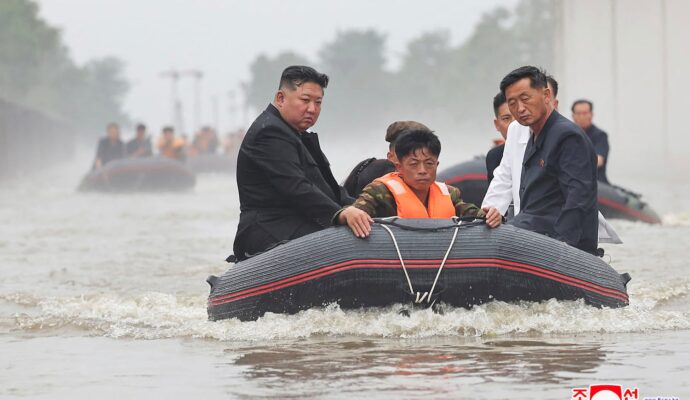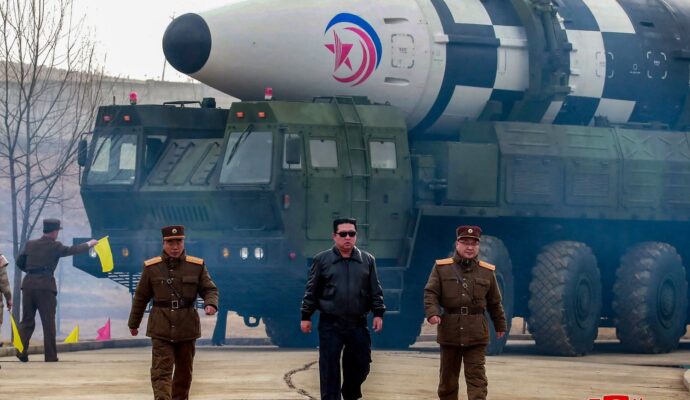Read about this topic in Korean.
As South Korean President Lee Jae-myung begins his term pledging dialogue and economic cooperation with Pyongyang, North Koreans—both at home and abroad—are reacting with a mix of hope, indifference, and deep-rooted skepticism.
According to sources inside North Korea, the outcome of South Korea’s 21st presidential election quickly spread among the population after Lee’s victory on Tuesday. North Korean authorities confirmed Lee’s win via state media the following day, offering only a brief, commentary-free report.
In interviews with RFA’s Korean Service, several North Korean citizens expressed disillusionment with past inter-Korean outreach efforts and remained doubtful that new leadership in Seoul would lead to any material change in their daily lives.
“People remember that former South Korean presidents like Kim Dae-jung and Moon Jae-in were friendly toward the North,” said a resident of North Hamgyong Province who requested anonymity for safety reasons. “But their policies did nothing to improve the living standards of ordinary North Koreans. So there’s a lot of cynicism now.”
The source added that while Lee’s stated interest in inter-Korean dialogue had generated some initial attention, many in the North believe that hostility between the two governments—still technically at war—will limit any real progress.
Another source in North Pyongan Province echoed the sentiment. “No matter who becomes the president in the South, it’s always the same,” the resident said. “They talk about peace and unification, but nothing ever really changes for us.”
North Korean traders are upbeat
Some officials within North Korea’s foreign trade sector, however, appeared more optimistic.
In Dalian and Shenyang, two Chinese cities where many North Korean business officials are based, news of Lee’s election was met with guarded hope. One trade official in Dalian told RFA that he had been closely following South Korean media coverage throughout the election and was “glad” to see Lee, a Democratic Party candidate, win.
“Some of us gathered this morning at the logistics center in Dandong,” he said. “People were saying Lee’s victory could be a good sign for inter-Korean economic cooperation.”
Restaurant operators and businesspeople in China, many of whom rely on South Korean clientele, also welcomed the news. “When inter-Korean tensions rise, we see a steep drop in South Korean customers,” said a North Korean restaurant owner in Shenyang. “So a president like Lee, who might revive cross-border ties, gives us hope for better business.”
Due to government measures, North Korean restaurants abroad have not accepted South Korean customers since 2023. However, during periods of improved inter-Korean relations, South Koreans have been allowed to visit and have been a major source of income for these establishments.
North treats South as ‘hostile separate state’
Observers note that Lee’s predecessor, Yoon Suk Yeol, took a hardline stance on North Korea, which contributed to a prolonged freeze in inter-Korean exchanges. Lee, by contrast, emphasized diplomacy and engagement in his inaugural address.
“While we will firmly respond to provocations, we will keep communication channels open with the North,” Lee said during his swearing-in ceremony at the National Assembly on Wednesday. “Through dialogue and cooperation, we aim to build peace on the Korean Peninsula.”
Despite these words, some North Koreans remain unconvinced. “Unless inter-Korean relations lead to tangible benefits for people’s lives, there will be little enthusiasm here,” said the source in North Hamgyong Province. “Right now, most people don’t see much to be hopeful about.”
In contrast to past elections, North Korea hasn’t commented much on this campaign and the outcome.
In previous elections, particularly those resulting in conservative victories, North Korea media greeted the result with hostile commentary. This time, they simply reported Lee’s win without ideological framing or criticism.
Analysts say this restraint aligns with Pyongyang’s current doctrine of treating South Korea as a “hostile separate state,” a stance solidified since late 2023.
Former U.S. diplomat Evans Revere told RFA this reflects a formal shift in policy by the People’s Democratic Republic of Korea, or DPRK, as the North is formally known.
“It is now officially the policy of the DPRK leadership and ruling party not only to cut off all communication with the South but also to abandon the very idea of reunification and reconciliation,” Revere said.
“There are now no ties, no contacts, no communications—virtually nothing in common between the two sides,” he said.
Victor Cha, a former White House official and Korea Chair at the Center for Strategic and International Studies think tank in Washington, noted that Lee’s administration is still rooted in the progressive belief that inter-Korean engagement and reconciliation are essential.
“I think he will continue to make that point and press forward with it,” Cha said at a CSIS event, but he was skeptical it would work, adding: “The North Koreans do not appear to be interested in engaging.”
Translation and additional reporting by Jaewoo Park. Edited by Sungwon Yang


